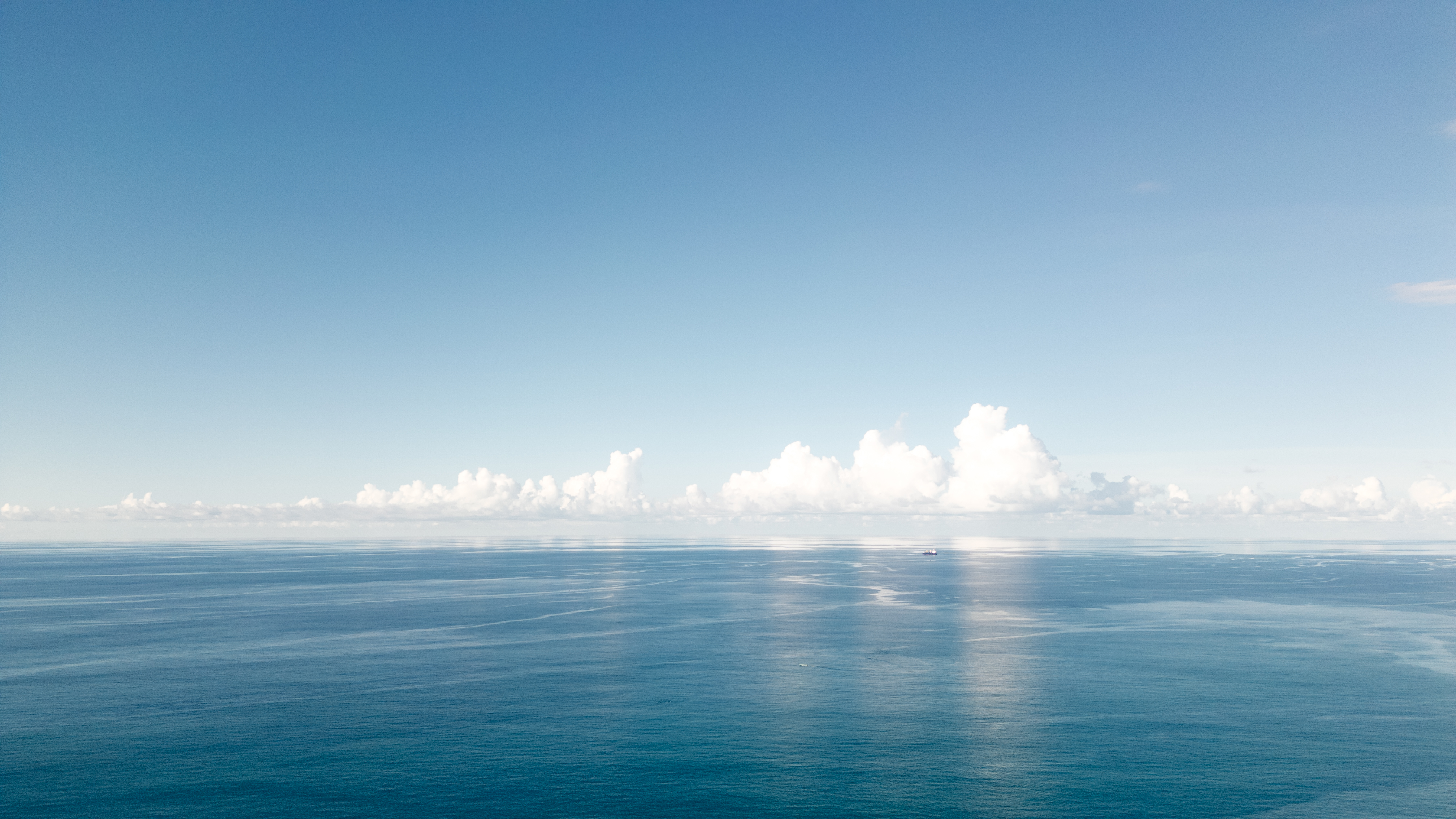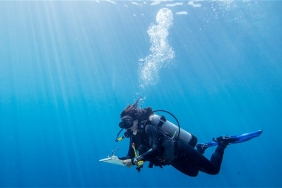STUDENTS ELLABORATED THE SPIRITS OF "BLUE ECONOMY"
A number of the students in the Youth Think Thank of various universities in Indonesia which was chosen by an essay competition on Blue Economy describes the ideas in a seminar organized by the Ministry of Maritime Affairs and Fisheries (MMAF) through the National Coordination Comeettee for Coral Triangle Initiative (CTI-NCC) in collaboration with WWF-Indonesia, on December 4, 2012 at the Golden Flower Hotel, Bandung, West Java.
The purpose of the Youth Think Tank is exploring creative businesses ideas in accordance with the 'spirit' of Blue Economy. They will take part in the challenging world of business in the third meeting of Regional Business Forum (The 3rd Coral Triangle Regional Business Forum / 3rd CT-RBF) in Denpasar, Bali on 25 to 27 March 2013 (www.ctirbf2013.com). CT-RBF is a business forum meeting involving six countries in the world in the area of coral triangle including Indonesia, Malaysia, Philippines, Papua New Guinea, Timor Leste, and Solomon Islands.
Drajad Sarwo Seto (23 years old) from the University of Gadjah Mada presenting creative ideas to make silage from waste products and skin of the fish belly at Baron Beach in Yogyakarta. Fish waste silage is processed for animal feed mixes (mammals, birds, and fishes).
Baron Beach is located in the village of Kemadang, District Tanjung sari, Gunung Kidul, Yogyakarta. A gulf beach is flanked by two hills on the right and left. Brownish sand lined with fishing boats. This beach is a favorite families and young children tourist spot including Seto and his friends for the weekend. This beach is also a science lab for them where they are student in the Department of Fisheries.
""Me and my friends often to Baron beach and eat fish there. But the delicious flavors interrupted by fish odor from fish waste, and was overpowering by flies,""said Seto, a young man who like sightseeing and diving.
According to Seto data research, in 2011 there were 26 restaurants at Baron Beach providing grilled fish dishes. Travellers can book directly on the spot or buy the fish at the Fish Auction Place (TPI) nearby, then ask the restaurants to cook the fish for the consumers. Unfortunately, the fish guts and scales is thrown away inviting flies arrive and certainly produces terrible odor.
Seto together his friends were active in Hydrobiology laboratories conducting research to overcome the problem of seafood industry and try to make value added products. Through a series of studies and trials, they managed to create a mixture of silage as animal food products.
Silage made from processed waste and fish scales by using formic acid and propionate acid. Acids can be replaced with a certain amount of vinegar. Further processed stage includes storing it in a sealed bucket for 6-7 days. During the process the dough periodically stirred to mix evenly. This process will result in silage in liquid that can be mixed with bran.
Seto and companions do not hesitate to share knowledge making Silage to Baron coastal villagers. Their innovations very useful for LELAKI (Cat Fish Aquaculture) program, as well as cow and goat farm.
""Once people know to make silage, no longer flies and odor from the fish waste on the beach Baron. We are also then enjoying eating seafood. People thn are also happy because they can get additional revenues. "" Seto concluded proudly.
In addition to the Baron’s, they were awarded the Innovation of the Directorate General of Higher Education (DIKTI), Ministry of Education and Culture of the Republic of Indonesia for the category of community service in 2011.
Besides Seto, the other Youth Think Thank is Ni Putu Lilis Aristiarini (20 years old), a student majoring in Tourism Destination, Udayana University, Bali, who also offers creative business ideas contain coconut fiber. At first she was sad to see the waste of coconuts strewn in tourist destinations like Kuta Beach, Pura Besakih, and Pura Tanah Lot. This waste comes from coconut ice merchants from restaurants and street vendors in the region. Lilis then focusing research and experiments in the Pura Tanah Lot.
""I do not think tourists come to Bali to see the garbage. This is eradicate the beautiful image of tourism in Bali. "" Lilis said grimly.
According to Lilis, every day in the tourist area of Pura Tanah Lot generate 4 cubic meters of waste. The amount of waste is growing along with the increasing number of tourist visits, especially the holiday season and after ritual activities. Waste from coconut is the most commonly found. Officers hassles because traders is not discipline in cleaning up the waste, coconut trash piled in front of the place.
""The tourism sector contributing to the revenue of Province of Bali in most. The tourism industry is the backbone of the economy of the Balinese people. "" Said Lilis in the middle of his presentation.
Lilis, including students who are not only complaining about the condition, but she is working to find a solution by examining seriously to alter the coconut waste into new materials such as coconut fiber. The processes takes some stages to be coconut fibers with a certain quality. By using assemblied decoder engine, coconut fiber produced further will be cut into pieces with a minimum length of 10 centimeters. The assemblied machine also automatically generate coconut powder (coco peat). In addition to degrading machinery, the filtering machine is added to separate the short-sized fibers with remaining coconut powder. Coconut fiber products produced from this machine then prints the cube-shaped then exported as an industrial material for sofas, mattresses, and more.
""If anyone wants to open a business for this, I am ready to help calculate business calculations,"" Lilis delivered with a big smile.
Lilis challenges businesses and government to develop new ideas both in small and large scale. Lilis concern not only the waste bin of coconuts in around Tanah Lot tourist area are handled, but all coconuts waste generated from all over the restaurant and hospitality industry in Bali. Conceivably this innovation will also contribute to opening up new job opportunities for the citizens of Bali.
""I like the idea. I think that is the 'spirit' of Blue Economy. Time to start from what is around us, rather than something that does not exist and still imaginary. Often, people think to start Blue Economy of something big ""said Dr. Lida Pet-Soede, Coordinator of the WWF Coral Triangle Global Initiative, in response to the exposure of these students.
Other participants worked on the answering the challenges of blue economy such the idea of Business Strategy In Marine Protected Areas Region presented by Albert King Siagian, students Indonesia University - Jakarta; idea about Commodities Localization as Key Success in Fishing Industry presented by Rahmad Royan from Airlangga University - Surabaya; ideas on Sustainable Seafood delivered by Evi Nurul Ihsan, Diponegoro University students - Semarang; idea of Reefs Transplantation As Corporate Responsibility Strategy presented by Kurniawati, Budi Luhur University student - Jakarta.
In the discussion session, students had the opportunity to explore the ideas into a business that they offer more in-depth concepts of the Blue Economy. Mainly how to make this concept acceptable and attractive to businesses. ""From a business standpoint, employers will see what’s the benefit for them when applying this concept, what incentives or support they will get when they start?"", asked by King Albert Siagian, one of the Youth Think Tank, who also involved in a exciting discussion later on.
At the end of the seminar they agreed that the implementation of the Blue Economy is by managing local resources optimally, and it requires creative human resources, combined with innovative technology to use natural resources wisely. They also expect the seriousness of the government to create a better entrepreneurial climate with regulations that support. The government and the private sector are expected to invest in the field of research for the development of environmentally friendly technologies. The first step can be started from the university as an institution that produces qualified human resources.
""I see the spirit of the Blue Economy on Youth Think Tank, I hope that students can later deliver business solutions or ideas to the private sector on the upcoming 3rd Coral Triangle Regional Businness Forum in Nusa Dua, Bali"" said Victor PH Nikijuluw, Directorate General of Processing and Marketing of Fisheries (P2HP) of the MMAF Republic of Indonesia, while closing the seminar series. (HKokoh)
Contact: Dewi Satriani, Communications Manager WWF-Indonesia Marine Program, dsatriani@wwf.or.id





